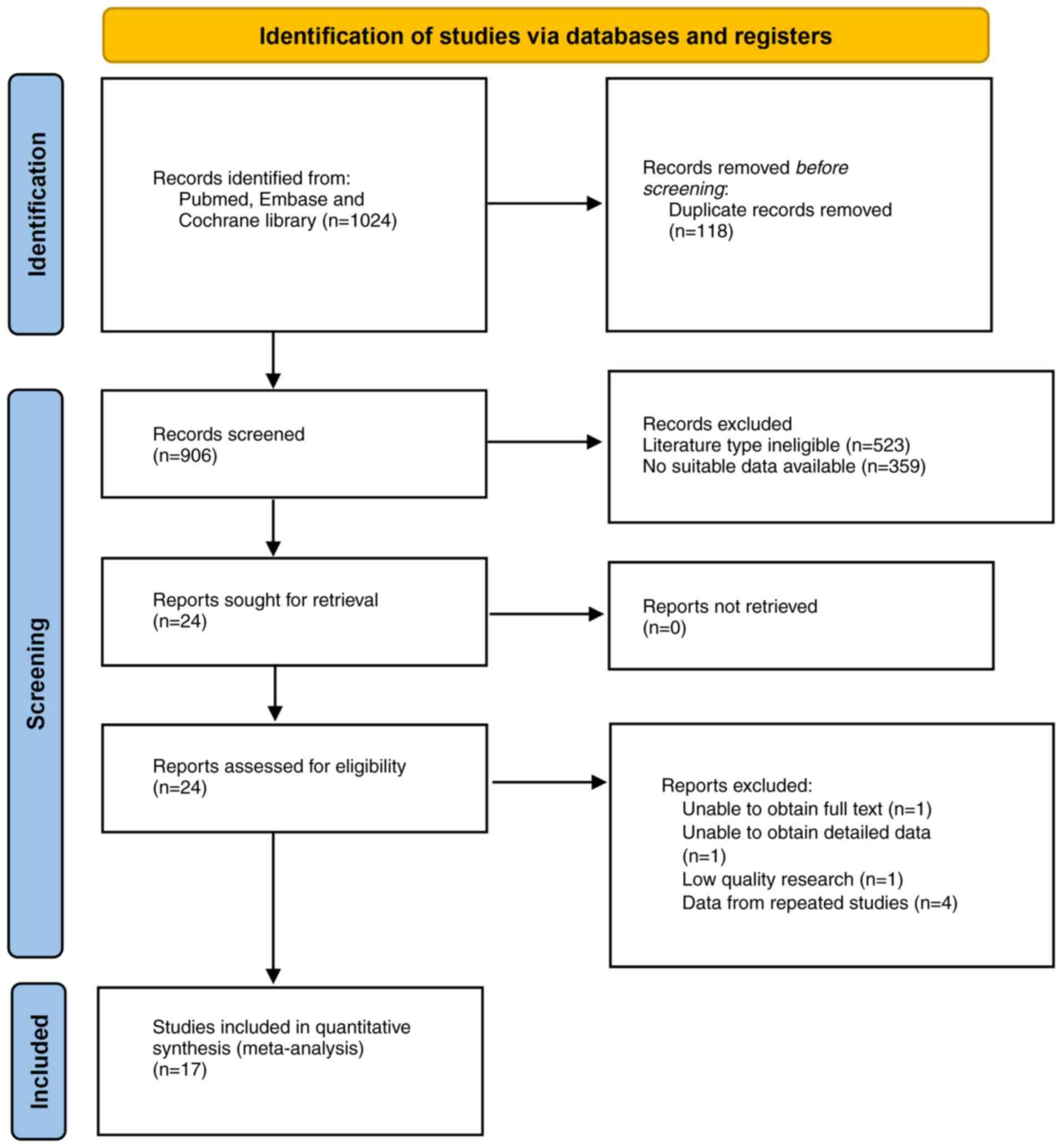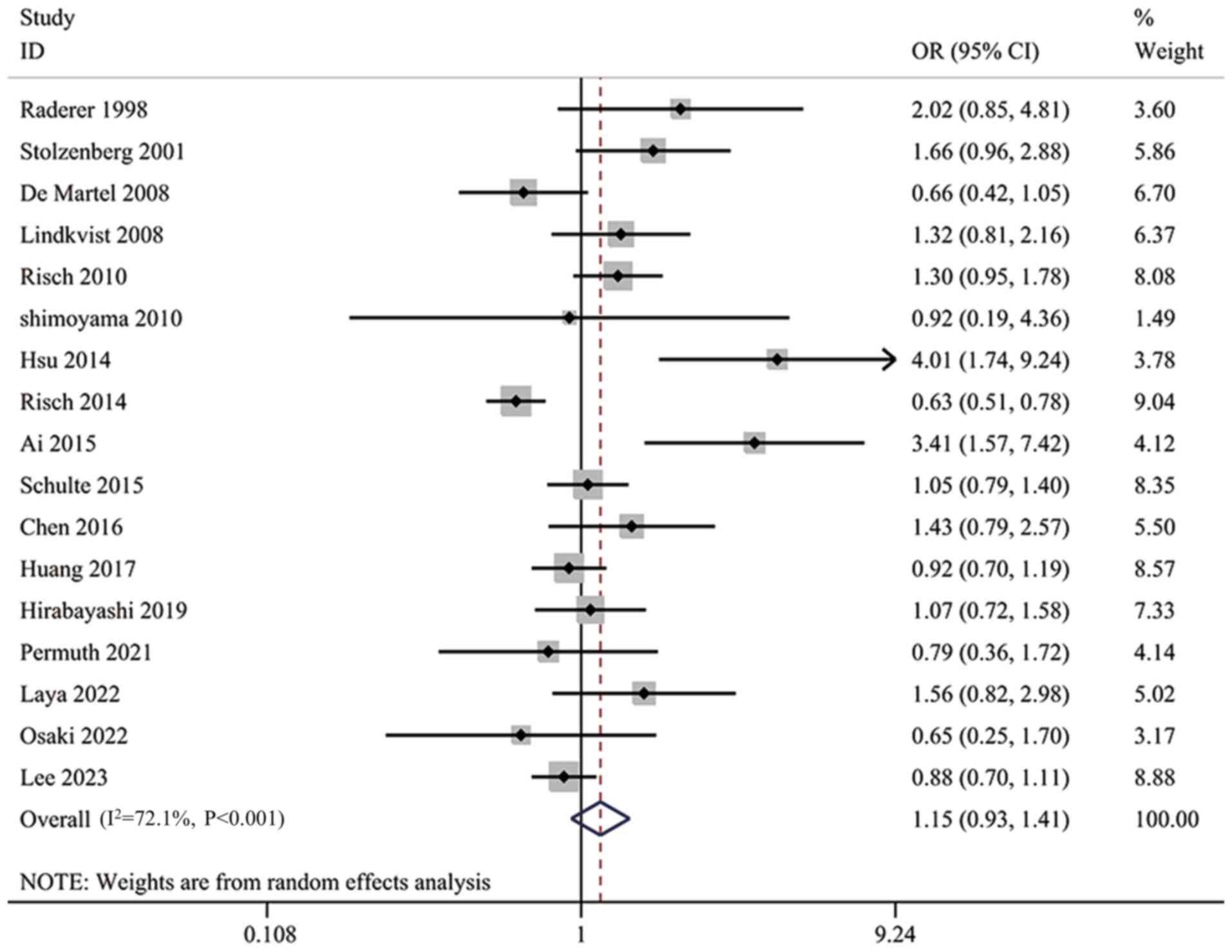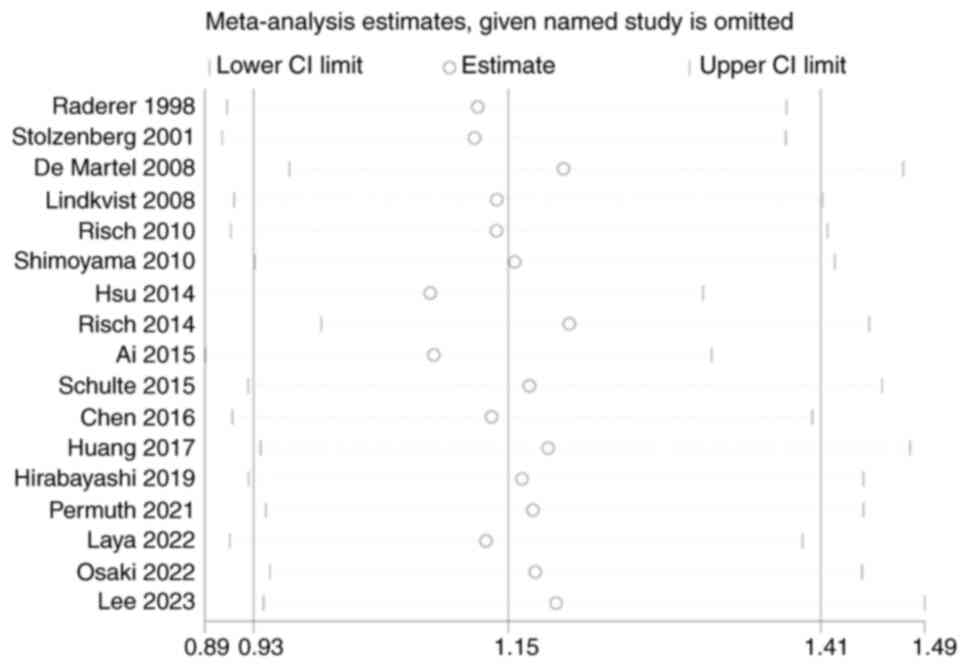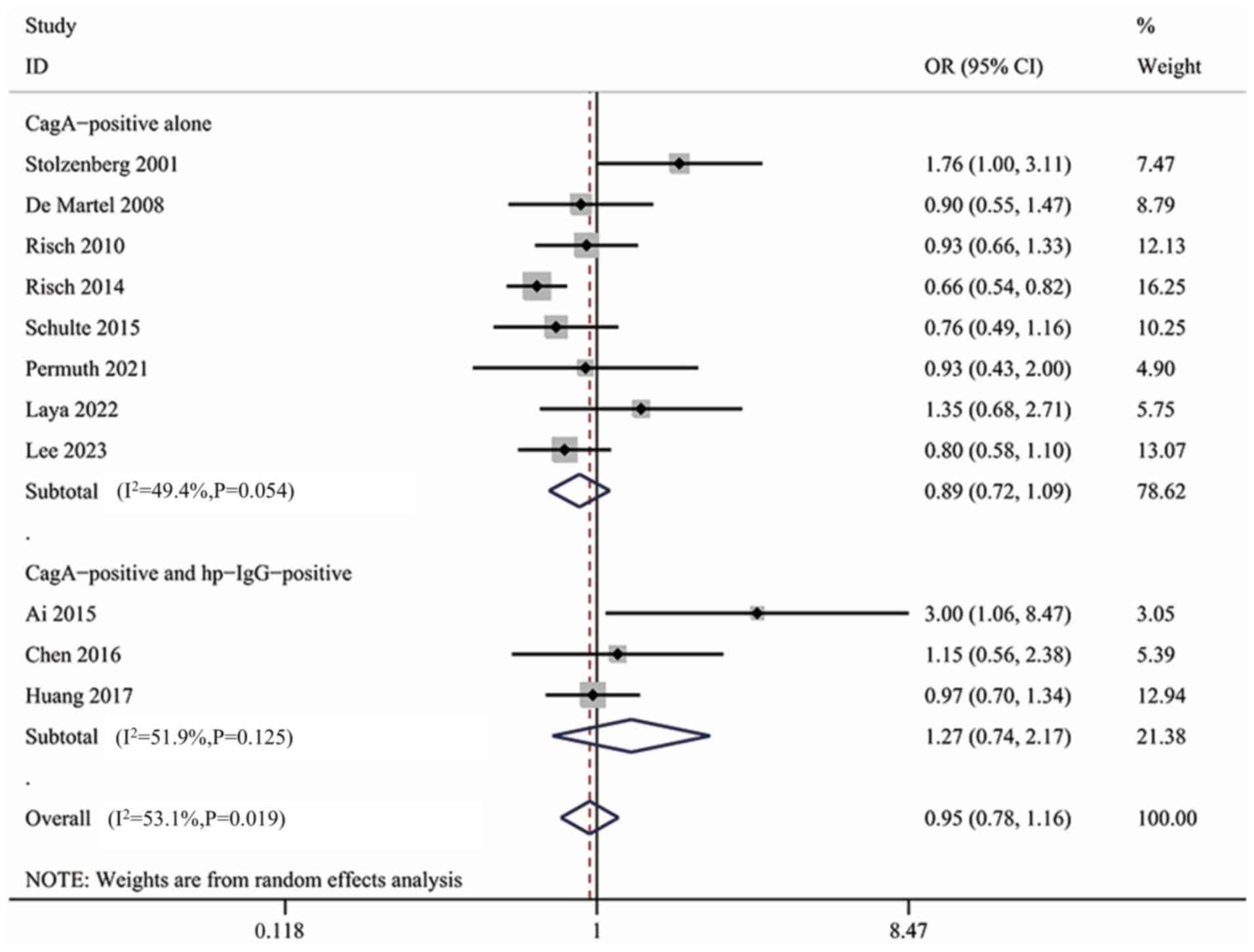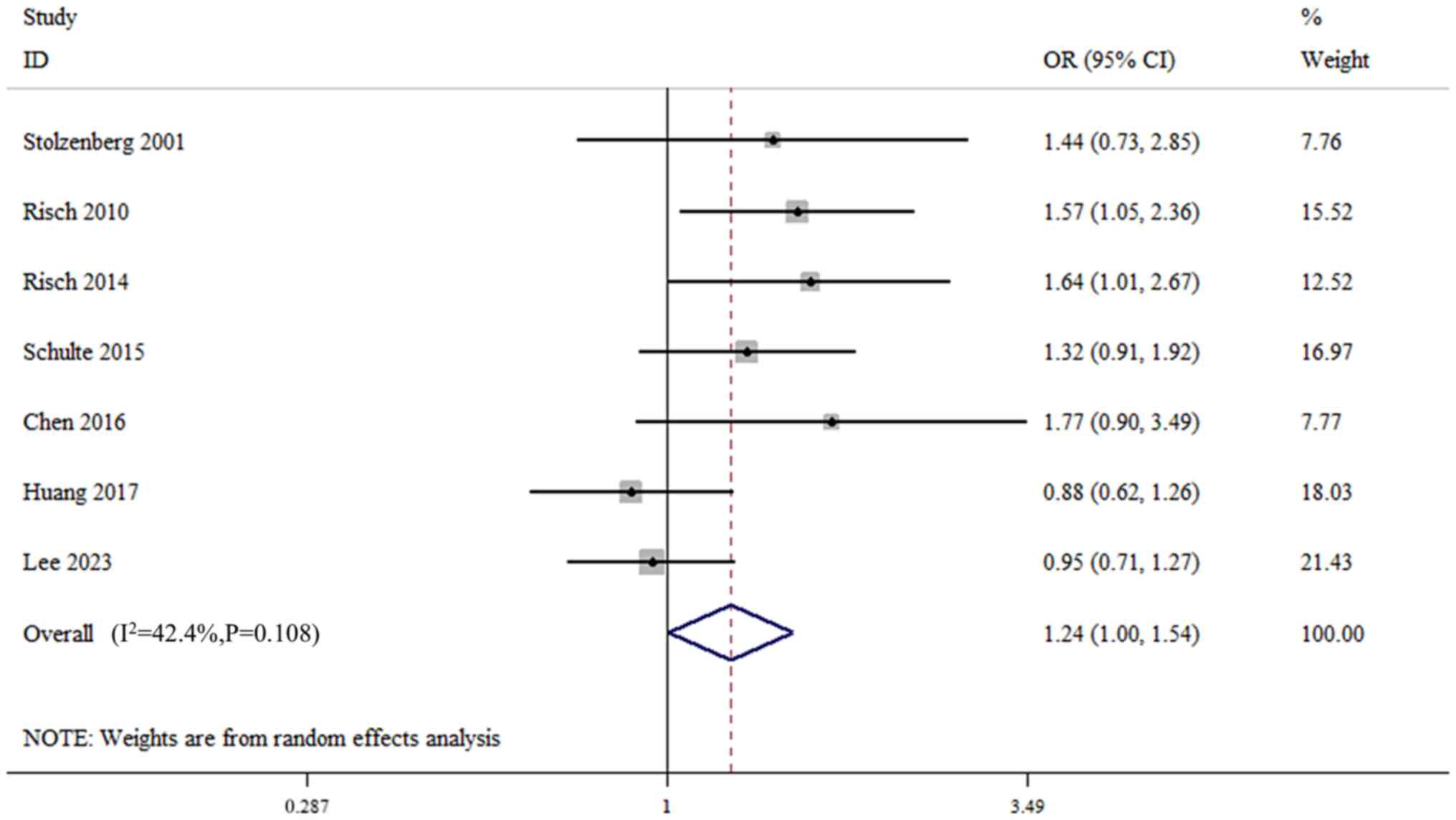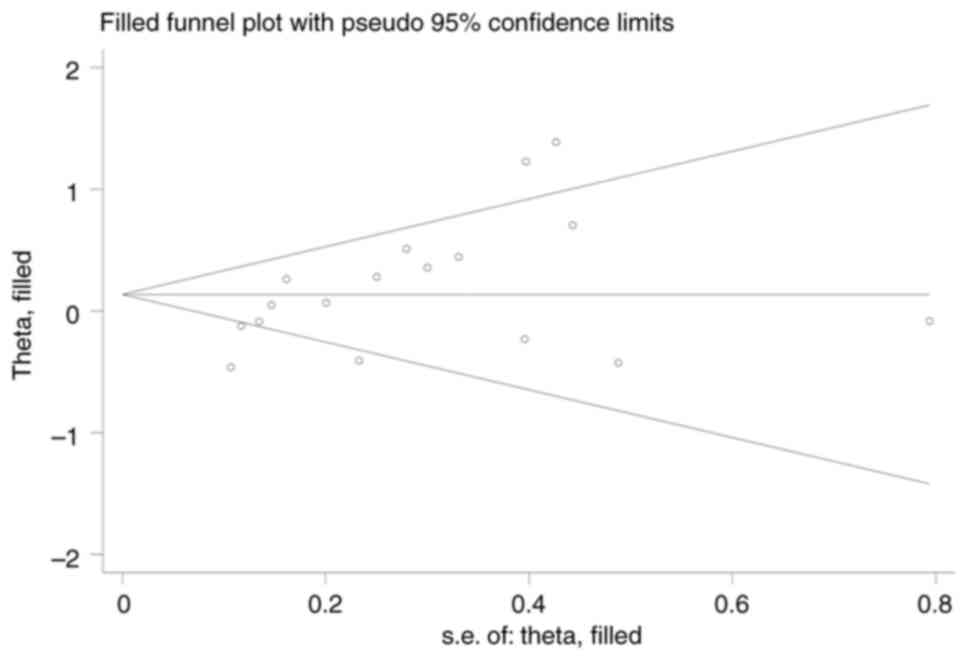|
1
|
Crowe SE: Helicobacter pylori infection. N
Engl J Med. 380:1158–1165. 2019. View Article : Google Scholar : PubMed/NCBI
|
|
2
|
Marshall BJ and Warren JR: Unidentified
curved bacilli in the stomach of patients with gastritis and peptic
ulceration. Lancet. 1:1311–1315. 1984. View Article : Google Scholar : PubMed/NCBI
|
|
3
|
Wang W, Cui Y, Wei X, Zang Y, Chen X,
Cheng L and Wang X: CuCo2O4 nanoflowers with
multiple enzyme activities for treating bacterium-infected wounds
via cuproptosis-like death. ACS Nano. 18:15845–15863. 2024.
View Article : Google Scholar : PubMed/NCBI
|
|
4
|
Xing J, Shan J, Xue H, Zhang H, Cheng L,
Hao J and Wang X: Multifunctional adaptable injectable TiN-based
hydrogels for antitumor and antidrug-resistant bacterial therapy.
Adv Healthc Mater. 13:e24002972024. View Article : Google Scholar : PubMed/NCBI
|
|
5
|
Hu Z, Shan J, Jin X, Sun W, Cheng L, Chen
XL and Wang X: Nanoarchitectonics of in situ antibiotic-releasing
acicular nanozymes for targeting and inducing cuproptosis-like
death to eliminate drug-resistant bacteria. ACS Nano.
18:24327–24349. 2024. View Article : Google Scholar : PubMed/NCBI
|
|
6
|
Peek RM Jr and Blaser MJ: Helicobacter
pylori and gastrointestinal tract adenocarcinomas. Nat Rev Cancer.
2:28–37. 2002. View
Article : Google Scholar : PubMed/NCBI
|
|
7
|
Malfertheiner P, Megraud F, O'Morain CA,
Gisbert JP, Kuipers EJ, Axon AT, Bazzoli F, Gasbarrini A, Atherton
J, Graham DY, et al: Management of helicobacter pylori
infection-the maastricht V/Florence consensus report. Gut. 66:6–30.
2017. View Article : Google Scholar : PubMed/NCBI
|
|
8
|
Zhang C, Chen Y, Long Y, Zheng H, Jing J
and Pan W: Helicobacter pylori and gastrointestinal cancers: Recent
advances and controversies. Clin Med Insights Oncol.
18:117955492412346372024. View Article : Google Scholar : PubMed/NCBI
|
|
9
|
Vincent A, Herman J, Schulick R, Hruban RH
and Goggins M: Pancreatic cancer. Lancet. 378:607–620. 2011.
View Article : Google Scholar : PubMed/NCBI
|
|
10
|
Stoffel EM, Brand RE and Goggins M:
Pancreatic cancer: Changing epidemiology and new approaches to risk
assessment, early detection, and prevention. Gastroenterology.
164:752–765. 2023. View Article : Google Scholar : PubMed/NCBI
|
|
11
|
Bray F, Laversanne M, Sung H, Ferlay J,
Siegel RL, Soerjomataram I and Jemal A: Global cancer statistics
2022: GLOBOCAN estimates of incidence and mortality worldwide for
36 cancers in 185 countries. CA Cancer J Clin. 74:229–263. 2024.
View Article : Google Scholar : PubMed/NCBI
|
|
12
|
Whitcomb DC, Shelton CA and Brand RE:
Genetics and genetic testing in pancreatic cancer.
Gastroenterology. 149:1252–1264.e4. 2015. View Article : Google Scholar : PubMed/NCBI
|
|
13
|
Klein AP: Pancreatic cancer epidemiology:
Understanding the role of lifestyle and inherited risk factors. Nat
Rev Gastroenterol Hepatol. 18:493–502. 2021. View Article : Google Scholar : PubMed/NCBI
|
|
14
|
Bosetti C, Lucenteforte E, Silverman DT,
Petersen G, Bracci PM, Ji BT, Negri E, Li D, Risch HA, Olson SH, et
al: Cigarette smoking and pancreatic cancer: An analysis from the
international pancreatic cancer case-control consortium (Panc4).
Ann Oncol. 23:1880–1888. 2012. View Article : Google Scholar : PubMed/NCBI
|
|
15
|
Franceschi F, Tortora A, Gasbarrini G and
Gasbarrini A: Helicobacter pylori and extragastric diseases.
Helicobacter. 19 (Suppl 10):S52–S58. 2014. View Article : Google Scholar
|
|
16
|
Huang J, Zagai U, Hallmans G, Nyrén O,
Engstrand L, Stolzenberg-Solomon R, Duell EJ, Overvad K, Katzke VA,
Kaaks R, et al: Helicobacter pylori infection, chronic corpus
atrophic gastritis and pancreatic cancer risk in the European
prospective investigation into cancer and nutrition (EPIC) cohort:
A nested case-control study. Int J Cancer. 140:1727–1735. 2017.
View Article : Google Scholar : PubMed/NCBI
|
|
17
|
Risch HA, Yu H, Lu L and Kidd MS: ABO
blood group, Helicobacter pylori seropositivity, and risk of
pancreatic cancer: A case-control study. J Natl Cancer Inst.
102:502–505. 2010. View Article : Google Scholar : PubMed/NCBI
|
|
18
|
Xiao M, Wang Y and Gao Y: Association
between Helicobacter pylori infection and pancreatic cancer
development: A meta-analysis. PLoS One. 8:e755592013. View Article : Google Scholar : PubMed/NCBI
|
|
19
|
Zhou BG, Mei YZ, Wang JS, Xia JL, Jiang X,
Ju SY and Ding YB: Is Helicobacter pylori infection associated with
pancreatic cancer? A systematic review and meta-analysis of
observational studies. Ther Adv Chronic Dis.
14:204062232311551192023. View Article : Google Scholar : PubMed/NCBI
|
|
20
|
Schulte A, Pandeya N, Fawcett J, Fritschi
L, Risch HA, Webb PM, Whiteman DC and Neale RE: Association between
Helicobacter pylori and pancreatic cancer risk: A meta-analysis.
Cancer Causes Control. 26:1027–1035. 2015. View Article : Google Scholar : PubMed/NCBI
|
|
21
|
Page MJ, McKenzie JE, Bossuyt PM, Boutron
I, Hoffmann TC, Mulrow CD, Shamseer L, Tetzlaff JM, Akl EA, Brennan
SE, et al: The PRISMA 2020 statement: An updated guideline for
reporting systematic reviews. BMJ. 372:n712021. View Article : Google Scholar : PubMed/NCBI
|
|
22
|
Stang A: Critical evaluation of the
Newcastle-Ottawa scale for the assessment of the quality of
nonrandomized studies in meta-analyses. Eur J Epidemiol.
25:603–605. 2010. View Article : Google Scholar : PubMed/NCBI
|
|
23
|
Higgins JP and Thompson SG: Quantifying
heterogeneity in a meta-analysis. Stat Med. 21:1539–1558. 2002.
View Article : Google Scholar : PubMed/NCBI
|
|
24
|
Begg CB and Mazumdar M: Operating
characteristics of a rank correlation test for publication bias.
Biometrics. 50:1088–1101. 1994. View Article : Google Scholar : PubMed/NCBI
|
|
25
|
Egger M, Smith GD, Schneider M and Minder
C: Bias in meta-analysis detected by a simple, graphical test. BMJ.
315:629–634. 1997. View Article : Google Scholar : PubMed/NCBI
|
|
26
|
Duval S and Tweedie R: Trim and fill: A
simple funnel-plot-based method of testing and adjusting for
publication bias in meta-analysis. Biometrics. 56:455–463. 2000.
View Article : Google Scholar : PubMed/NCBI
|
|
27
|
Stolzenberg-Solomon RZ, Blaser MJ, Limburg
PJ, Perez-Perez G, Taylor PR, Virtamo J and Albanes D; ATBC Study,
: Helicobacter pylori seropositivity as a risk factor for
pancreatic cancer. J Natl Cancer Inst. 93:937–941. 2001. View Article : Google Scholar : PubMed/NCBI
|
|
28
|
Lee AA, Wang QL, Kim J, Babic A, Zhang X,
Perez K, Ng K, Nowak J, Rifai N, Sesso HD, et al: Helicobacter
pylori seropositivity, ABO blood type, and pancreatic cancer risk
from 5 prospective cohorts. Clin Transl Gastroenterol.
14:e005732023. View Article : Google Scholar : PubMed/NCBI
|
|
29
|
Risch HA, Lu L, Kidd MS, Wang J, Zhang W,
Ni Q, Gao YT and Yu H: Helicobacter pylori seropositivities and
risk of pancreatic carcinoma. Cancer Epidemiol Biomarkers Prev.
23:172–178. 2014. View Article : Google Scholar : PubMed/NCBI
|
|
30
|
de Martel C, Llosa AE, Friedman GD,
Vogelman JH, Orentreich N, Stolzenberg-Solomon RZ and Parsonnet J:
Helicobacter pylori infection and development of pancreatic cancer.
Cancer Epidemiol Biomarkers Prev. 17:1188–1194. 2008. View Article : Google Scholar : PubMed/NCBI
|
|
31
|
Permuth JB, Rahman S, Chen DT, Waterboer T
and Giuliano AR: A case control study of the seroprevalence of
helicobacter pylori proteins and their association with pancreatic
cancer risk. J Pancreat Cancer. 7:57–64. 2021. View Article : Google Scholar : PubMed/NCBI
|
|
32
|
Hirabayashi M, Inoue M, Sawada N, Saito E,
Abe SK, Hidaka A, Iwasaki M, Yamaji T, Shimazu T and Tsugane S:
Helicobacter pylori infection, atrophic gastritis, and risk of
pancreatic cancer: A population-based cohort study in a large
Japanese population: The JPHC study. Sci Rep. 9:60992019.
View Article : Google Scholar : PubMed/NCBI
|
|
33
|
Raderer M, Wrba F, Kornek G, Maca T,
Koller DY, Weinlaender G, Hejna M and Scheithauer W: Association
between Helicobacter pylori infection and pancreatic cancer.
Oncology. 55:16–19. 1998. View Article : Google Scholar : PubMed/NCBI
|
|
34
|
Lindkvist B, Johansen D, Borgström A and
Manjer J: A prospective study of Helicobacter pylori in relation to
the risk for pancreatic cancer. BMC Cancer. 8:3212008. View Article : Google Scholar : PubMed/NCBI
|
|
35
|
Ai F, Hua X, Liu Y, Lin J and Feng Z:
Preliminary study of pancreatic cancer associated with Helicobacter
pylori infection. Cell Biochem Biophys. 71:397–400. 2015.
View Article : Google Scholar : PubMed/NCBI
|
|
36
|
Hsu WY, Lin CH, Lin CC, Sung FC, Hsu CP
and Kao CH: The relationship between Helicobacter pylori and cancer
risk. Eur J Intern Med. 25:235–240. 2014. View Article : Google Scholar : PubMed/NCBI
|
|
37
|
Chen XZ, Schöttker B, Castro FA, Chen H,
Zhang Y, Holleczek B and Brenner H: Association of helicobacter
pylori infection and chronic atrophic gastritis with risk of
colonic, pancreatic and gastric cancer: A ten-year follow-up of the
ESTHER cohort study. Oncotarget. 7:17182–17193. 2016. View Article : Google Scholar : PubMed/NCBI
|
|
38
|
Shimoyama T, Takahashi R, Abe D, Mizuki I,
Endo T and Fukuda S: Serological analysis of Helicobacter hepaticus
infection in patients with biliary and pancreatic diseases. J
Gastroenterol Hepatol. 25 (Suppl 1):S86–S89. 2010. View Article : Google Scholar : PubMed/NCBI
|
|
39
|
Laya GB, Anandhi A, Gurushankari B, Mandal
J and Kate V: Association between helicobacter pylori and
periampullary and pancreatic cancer: A case-control study. J
Gastrointest Cancer. 53:902–907. 2022. View Article : Google Scholar : PubMed/NCBI
|
|
40
|
Osaki T, Lin Y, Sasahira N, Ueno M,
Yonezawa H, Hojo F, Okuda M, Matsuyama M, Sasaki T, Kobayashi S, et
al: Prevalence estimates of helicobacter species infection in
pancreatic and biliary tract cancers. Helicobacter. 27:e128662022.
View Article : Google Scholar : PubMed/NCBI
|
|
41
|
Yu G, Murphy G, Michel A, Weinstein SJ,
Männistö S, Albanes D, Pawlita M and Stolzenberg-Solomon RZ:
Seropositivity to Helicobacter pylori and risk of pancreatic
cancer. Cancer Epidemiol Biomarkers Prev. 22:2416–2419. 2013.
View Article : Google Scholar : PubMed/NCBI
|
|
42
|
Chen Sackett DL, Rosenberg WM, Gray JA,
Haynes RB and Richardson WS: Evidence based medicine: What it is
and what it isn't. BMJ. 312:71–72. 1996. View Article : Google Scholar : PubMed/NCBI
|
|
43
|
Guyatt GH, Oxman AD, Vist GE, Kunz R,
Falck-Ytter Y, Alonso-Coello P and Schünemann HJ; GRADE Working
Group, : GRADE: An emerging consensus on rating quality of evidence
and strength of recommendations. BMJ. 336:924–926. 2008. View Article : Google Scholar : PubMed/NCBI
|
|
44
|
Trikudanathan G, Philip A, Dasanu CA and
Baker WL: Association between Helicobacter pylori infection and
pancreatic cancer. A cumulative meta-analysis. JOP. 12:26–31.
2011.PubMed/NCBI
|
|
45
|
Liu H, Chen YT and Wang R XZ: Helicobacter
pylori infection, atrophic gastritis, and pancreatic cancer risk: A
meta-analysis of prospective epidemiologic studies. Medicine
(Baltimore). 96:e781112017.
|
|
46
|
Cover TL and Blanke SR: Helicobacter
pylori VacA, a paradigm for toxin multifunctionality. Nat Rev
Microbiol. 3:320–332. 2005. View Article : Google Scholar : PubMed/NCBI
|
|
47
|
Necchi V, Sommi P, Vanoli A, Fiocca R,
Ricci V and Solcia E: Natural history of Helicobacter pylori VacA
toxin in human gastric epithelium in vivo: Vacuoles and beyond. Sci
Rep. 7:145262017. View Article : Google Scholar : PubMed/NCBI
|
|
48
|
Posselt G, Backert S and Wessler S: The
functional interplay of Helicobacter pylori factors with gastric
epithelial cells induces a multi-step process in pathogenesis. Cell
Commun Signal. 11:772013. View Article : Google Scholar : PubMed/NCBI
|
|
49
|
Jiménez-Soto LF and Haas R: The CagA toxin
of Helicobacter pylori: Abundant production but relatively low
amount translocated. Sci Rep. 6:232272016. View Article : Google Scholar : PubMed/NCBI
|
|
50
|
Sierra JC, Piazuelo MB, Luis PB, Barry DP,
Allaman MM, Asim M, Sebrell TA, Finley JL, Rose KL, Hill S, et al:
Spermine oxidase mediates Helicobacter pylori-induced gastric
inflammation, DNA damage, and carcinogenic signaling. Oncogene.
39:4465–4474. 2020. View Article : Google Scholar : PubMed/NCBI
|
|
51
|
Chaturvedi R, de Sablet T, Asim M,
Piazuelo MB, Barry DP, Verriere TG, Sierra JC, Hardbower DM,
Delgado AG, Schneider BG, et al: Increased Helicobacter
pylori-associated gastric cancer risk in the Andean region of
Colombia is mediated by spermine oxidase. Oncogene. 34:3429–3440.
2015. View Article : Google Scholar : PubMed/NCBI
|
|
52
|
Gobert AP, Al-Greene NT, Singh K, Coburn
LA, Sierra JC, Verriere TG, Luis PB, Schneider C, Asim M, Allaman
MM, et al: Distinct immunomodulatory effects of spermine oxidase in
colitis induced by epithelial injury or infection. Front Immunol.
9:12422018. View Article : Google Scholar : PubMed/NCBI
|
|
53
|
Liu J, Xiao Q, Xiao J, Niu C, Li Y, Zhang
X, Zhou Z, Shu G and Yin G: Wnt/β-catenin signalling: Function,
biological mechanisms, and therapeutic opportunities. Signal
Transduct Target Ther. 7:32022. View Article : Google Scholar : PubMed/NCBI
|
|
54
|
Yu F, Yu C, Li F, Zuo Y, Wang Y, Yao L, Wu
C, Wang C and Ye L: Wnt/β-catenin signaling in cancers and targeted
therapies. Signal Transduct Target Ther. 6:3072021. View Article : Google Scholar : PubMed/NCBI
|
|
55
|
Yong X, Tang B, Xiao YF, Xie R, Qin Y, Luo
G, Hu CJ, Dong H and Yang SM: Helicobacter pylori upregulates Nanog
and Oct4 via Wnt/β-catenin signaling pathway to promote cancer stem
cell-like properties in human gastric cancer. Cancer Lett.
374:292–303. 2016. View Article : Google Scholar : PubMed/NCBI
|
|
56
|
Peng R, Xu C, Zhang L, Liu X, Peng D, Chen
X, Liu D and Li R: M2 macrophages participate in ILC2 activation
induced by Helicobacter pylori infection. Gut Microbes.
16:23470252024. View Article : Google Scholar : PubMed/NCBI
|
|
57
|
Cassetta L and Pollard JW: Targeting
macrophages: Therapeutic approaches in cancer. Nat Rev Drug Discov.
17:887–904. 2018. View Article : Google Scholar : PubMed/NCBI
|
|
58
|
Guo X, Zhao Y, Yan H, Yang Y, Shen S, Dai
X, Ji X, Ji F, Gong XG, Li L, et al: Single tumor-initiating cells
evade immune clearance by recruiting type II macrophages. Genes
Dev. 31:247–259. 2017. View Article : Google Scholar : PubMed/NCBI
|
|
59
|
Doak GR, Schwertfeger KL and Wood DK:
Distant relations: Macrophage functions in the metastatic niche.
Trends Cancer. 4:445–459. 2018. View Article : Google Scholar : PubMed/NCBI
|
|
60
|
Hardbower DM, de Sablet T, Chaturvedi R
and Wilson KT: Chronic inflammation and oxidative stress: The
smoking gun for Helicobacter pylori-induced gastric cancer? Gut
Microbes. 4:475–481. 2013. View Article : Google Scholar : PubMed/NCBI
|
|
61
|
Davies GR, Banatvala N, Collins CE, Sheaff
MT, Abdi Y, Clements L and Rampton DS: Relationship between
infective load of Helicobacter pylori and reactive oxygen
metabolite production in antral mucosa. Scand J Gastroenterol.
29:419–424. 1994. View Article : Google Scholar : PubMed/NCBI
|
|
62
|
Bagchi D, Bhattacharya G and Stohs SJ:
Production of reactive oxygen species by gastric cells in
association with Helicobacter pylori. Free Radic Res. 24:439–450.
1996. View Article : Google Scholar : PubMed/NCBI
|
|
63
|
Granger DN and Kvietys PR: Reperfusion
injury and reactive oxygen species: The evolution of a concept.
Redox Biol. 6:524–551. 2015. View Article : Google Scholar : PubMed/NCBI
|
|
64
|
Franco R and Vargas MR: Redox biology in
neurological function, dysfunction, and aging. Antioxid Redox
Signal. 28:1583–1586. 2018. View Article : Google Scholar : PubMed/NCBI
|
|
65
|
Moloney JN and Cotter TG: ROS signalling
in the biology of cancer. Semin Cell Dev Biol. 80:50–64. 2018.
View Article : Google Scholar : PubMed/NCBI
|
|
66
|
Srinivas US, Tan BWQ, Vellayappan BA and
Jeyasekharan AD: ROS and the DNA damage response in cancer. Redox
Biol. 25:1010842019. View Article : Google Scholar : PubMed/NCBI
|
|
67
|
Karita M and Blaser MJ: Acid-tolerance
response in Helicobacter pylori and differences between cagA+ and
cagA- strains. J Infect Dis. 178:213–219. 1998. View Article : Google Scholar : PubMed/NCBI
|
|
68
|
Kunovsky L, Dite P, Jabandziev P, Dolina
J, Vaculova J, Blaho M, Bojkova M, Dvorackova J, Uvirova M, Kala Z
and Trna J: Helicobacter pylori infection and other bacteria in
pancreatic cancer and autoimmune pancreatitis. World J Gastrointest
Oncol. 13:835–844. 2021. View Article : Google Scholar : PubMed/NCBI
|
|
69
|
Risch HA: Etiology of pancreatic cancer,
with a hypothesis concerning the role of N-nitroso compounds and
excess gastric acidity. J Natl Cancer Inst. 95:948–960. 2003.
View Article : Google Scholar : PubMed/NCBI
|
|
70
|
Storz P: Acinar cell plasticity and
development of pancreatic ductal adenocarcinoma. Nat Rev
Gastroenterol Hepatol. 14:296–304. 2017. View Article : Google Scholar : PubMed/NCBI
|
|
71
|
Marstrand-Daucé L, Lorenzo D, Chassac A,
Nicole P, Couvelard A and Haumaitre C: Acinar-to-Ductal metaplasia
(ADM): On the road to pancreatic intraepithelial neoplasia (PanIN)
and pancreatic cancer. Int J Mol Sci. 24:99462023. View Article : Google Scholar : PubMed/NCBI
|
|
72
|
Sozzi M, Valentini M, Figura N, De Paoli
P, Tedeschi RM, Gloghini A, Serraino D, Poletti M and Carbone A:
Atrophic gastritis and intestinal metaplasia in Helicobacter pylori
infection: The role of CagA status. Am J Gastroenterol. 93:375–379.
1998. View Article : Google Scholar : PubMed/NCBI
|
|
73
|
Sharndama HC and Mba IE: Helicobacter
pylori: An up-to-date overview on the virulence and pathogenesis
mechanisms. Braz J Microbiol. 53:33–50. 2022. View Article : Google Scholar : PubMed/NCBI
|
|
74
|
Kusters JG, van Vliet AH and Kuipers EJ:
Pathogenesis of Helicobacter pylori infection. Clin Microbiol Rev.
19:449–490. 2006. View Article : Google Scholar : PubMed/NCBI
|
|
75
|
Yamaoka Y: Mechanisms of disease:
Helicobacter pylori virulence factors. Nat Rev Gastroenterol
Hepatol. 7:629–641. 2010. View Article : Google Scholar : PubMed/NCBI
|
|
76
|
Lynch SM, Vrieling A, Lubin JH, Kraft P,
Mendelsohn JB, Hartge P, Canzian F, Steplowski E, Arslan AA, Gross
M, et al: Cigarette smoking and pancreatic cancer: A pooled
analysis from the pancreatic cancer cohort consortium. Am J
Epidemiol. 170:403–413. 2009. View Article : Google Scholar : PubMed/NCBI
|
|
77
|
Bosetti C, Rosato V, Li D, Silverman D,
Petersen GM, Bracci PM, Neale RE, Muscat J, Anderson K, Gallinger
S, et al: Diabetes, antidiabetic medications, and pancreatic cancer
risk: An analysis from the international pancreatic cancer
case-control consortium. Ann Oncol. 25:2065–2072. 2014. View Article : Google Scholar : PubMed/NCBI
|
|
78
|
Chari ST, Leibson CL, Rabe KG, Ransom J,
de Andrade M and Petersen GM: Probability of pancreatic cancer
following diabetes: A population-based study. Gastroenterology.
129:504–511. 2005. View Article : Google Scholar : PubMed/NCBI
|
|
79
|
Hu C, Hart SN, Polley EC, Gnanaolivu R,
Shimelis H, Lee KY, Lilyquist J, Na J, Moore R, Antwi SO, et al:
Association between inherited germline mutations in cancer
predisposition genes and risk of pancreatic cancer. JAMA.
319:2401–2409. 2018. View Article : Google Scholar : PubMed/NCBI
|
|
80
|
Zhen DB, Rabe KG, Gallinger S, Syngal S,
Schwartz AG, Goggins MG, Hruban RH, Cote ML, McWilliams RR, Roberts
NJ, et al: BRCA1, BRCA2, PALB2, and CDKN2A mutations in familial
pancreatic cancer: A PACGENE study. Genet Med. 17:569–577. 2015.
View Article : Google Scholar : PubMed/NCBI
|
|
81
|
Patel SK, Pratap CB, Jain AK, Gulati AK
and Nath G: Diagnosis of Helicobacter pylori: What should be the
gold standard? World J Gastroenterol. 20:12847–12859. 2014.
View Article : Google Scholar : PubMed/NCBI
|
|
82
|
Hooi JKY, Lai WY, Ng WK, Suen MMY,
Underwood FE, Tanyingoh D, Malfertheiner P, Graham DY, Wong VWS, Wu
JCY, et al: Global prevalence of helicobacter pylori infection:
Systematic review and meta-analysis. Gastroenterology. 153:420–429.
2017. View Article : Google Scholar : PubMed/NCBI
|
|
83
|
Li Y, Choi H, Leung K, Jiang F, Graham DY
and Leung WK: Global prevalence of Helicobacter pylori infection
between 1980 and 2022: A systematic review and meta-analysis.
Lancet Gastroenterol Hepatol. 8:553–564. 2023. View Article : Google Scholar : PubMed/NCBI
|
|
84
|
Mitchell H and Katelaris P: Epidemiology,
clinical impacts and current clinical management of Helicobacter
pylori infection. Med J Aust. 204:376–380. 2016. View Article : Google Scholar : PubMed/NCBI
|
|
85
|
Shah SC, Halvorson AE, Lee D, Bustamante
R, McBay B, Gupta R, Denton J, Dorn C, Wilson O, Peek R Jr, et al:
Helicobacter pylori Burden in the United States according to
individual demographics and geography: A nationwide analysis of the
veterans healthcare system. Clin Gastroenterol Hepatol.
22:42–50.e26. 2024. View Article : Google Scholar : PubMed/NCBI
|
|
86
|
Kist M, Strobel S, Kirchner T and Dammann
HG: Impact of ELISA and immunoblot as diagnostic tools one year
after eradication of Helicobacter pylori in a multicentre treatment
study. FEMS Immunol Med Microbiol. 24:239–242. 1999. View Article : Google Scholar : PubMed/NCBI
|
|
87
|
Lu CY, Kuo CH, Lo YC, Chuang HY, Yang YC,
Wu IC, Yu FJ, Lee YC, Jan CM, Wang WM and Wu DC: The best method of
detecting prior Helicobacter pylori infection. World J
Gastroenterol. 11:5672–5676. 2005. View Article : Google Scholar : PubMed/NCBI
|















